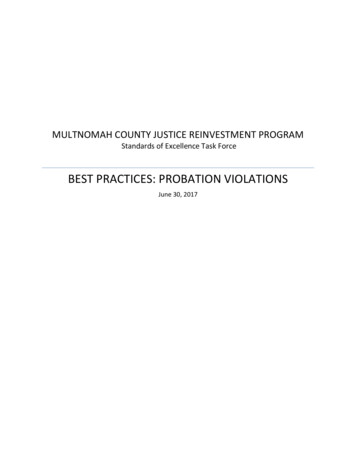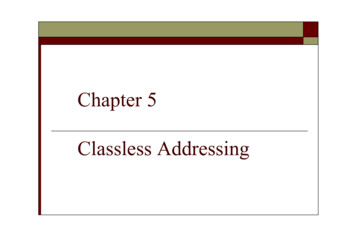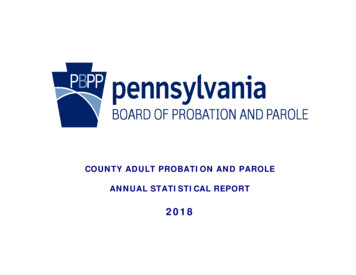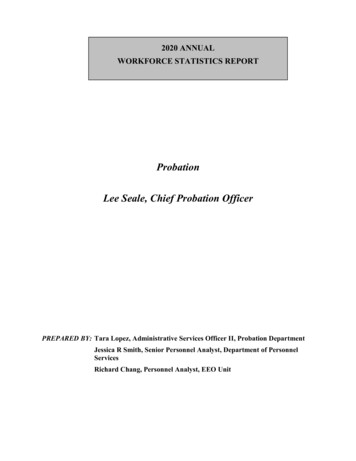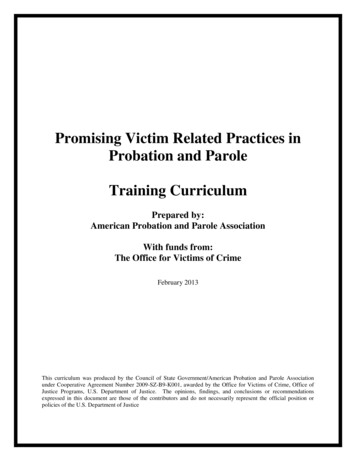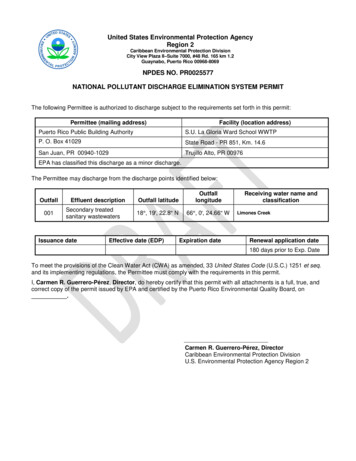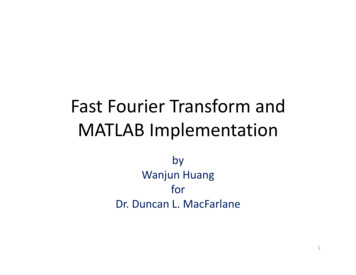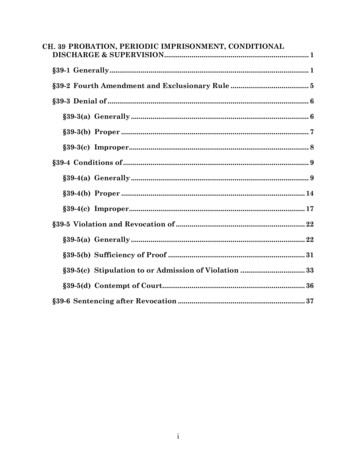
Transcription
PROBATION, PERIODIC IMPRISONMENT, CONDITIONALDISCHARGE & SUPERVISION . 1§39-1 Generally . 1§39-2 Fourth Amendment and Exclusionary Rule . 5§39-3 Denial of . 6§39-3(a) Generally . 6§39-3(b) Proper . 7§39-3(c) Improper. 8§39-4 Conditions of . 9§39-4(a) Generally . 9§39-4(b) Proper . 14§39-4(c) Improper. 17§39-5 Violation and Revocation of . 22§39-5(a) Generally . 22§39-5(b) Sufficiency of Proof . 31§39-5(c) Stipulation to or Admission of Violation . 33§39-5(d) Contempt of Court. 36§39-6 Sentencing after Revocation . 37i
PROBATION, PERIODIC IMPRISONMENT, CONDITIONAL DISCHARGE &SUPERVISION§39-1GenerallyIllinois Supreme CourtPeople v. Horrell, 235 Ill.2d 235, 919 N.E.2d 952 (2009) Where the defendant was sentencedto a term of probation on one count of a multi-count indictment, and the probation term wasto commence during the mandatory supervised release period imposed as part of concurrentprison terms for several other counts, the probation term was a permissible concurrentsentence and not a consecutive sentence to the prison term.1 The court noted that amandatory supervised release term is a required part of every prison sentence, and that adefendant who is serving a MSR term remains under sentence even after he is physicallyreleased from prison. Thus, a probation sentence to be served at the same time as an MSRterm on another offense is clearly a concurrent sentence.The court declined to consider what sentence could potentially be imposed if the trialcourt eventually decided to revoke probation, holding that such questions were not before thecourt in this appeal. (See also APPEAL, §2-6(a)).People v. Sheehan, 168 Ill.2d 298, 659 N.E.2d 1339 (1995) A DUI offense may be used toenhance a subsequent offense to a felony even where defendant successfully completed asentence of supervision.1. By using the term “committed” rather than “convicted” in the section authorizingenhancement of a third misdemeanor DUI to a felony, the legislature intended that any DUIviolation could be used, even if supervision had been completed and no conviction wasentered.2. The Court rejected the argument that the supervision statute prohibitsenhancement of an offense with a violation for which supervision was successfully completed.Illinois law allows offenses for which defendant has completed supervision to be used forenhancement in other situations; furthermore, though the supervision statute provides thatsupervision is not a “conviction” for purposes of “disqualification or disabilities imposed bylaw,” that provision refers only to rights that are lost as a matter of law upon conviction (suchas the rights to vote, possess a firearm, and hold public office).People v. Wendt, 163 Ill.2d 346, 645 N.E.2d 179 (1994) Although there is no specificlegislative authorization, the Unified Code of Corrections permits imposition of a probationsentence to be served consecutively to a term of imprisonment. But see, People v. Williams,179 Ill.2d 331, 688 N.E.2d 1153 (1997) (consecutive terms of imprisonment and probationwere improper where there was only one conviction).1Under730 ILCS 5/5-6-2(f), a probation sentence to be served after the MSR termhad been completed would be an impermissible consecutive sentence.1
Fitzsimmons v. Norgle, 104 Ill.2d 369, 472 N.E.2d 802 (1984) Chapter 38, §1005-53(c)(2)(F) (now 730 ILCS 5/5-5-3(c)(2)(F)), which precludes probation when a defendant isconvicted of a Class 2 felony and has a prior Class 2 felony conviction within 10 years, appliesto all “convictions,” regardless whether they were obtained after transfers from juvenilecourt. See also, People v. Wanke, 311 Ill.App.3d 801, 726 N.E.2d 142 (2d Dist. 2000) (730ILCS 5/5-5-3(c)(2)(F) prohibits probation only if a conviction for the prior offense was enteredbefore the instant offense occurred); People v. Daniels, 194 Ill.App.3d 648, 551 N.E.2d 297(1st Dist. 1990) (Chapter 38, §1005-5-3(c)(2)(F) applies to prior out-of-state convictions thatare equivalent to Class 2 or greater felonies under Illinois law).People v. Boykin, 94 Ill.2d 138, 445 N.E.2d 1174 (1983) A defendant who is found guilty ofa misdemeanor following a trial is eligible for sentence of supervision.People ex rel. Carey v. Bentivenga, 83 Ill.2d 537, 416 N.E.2d 259 (1981) A trial courtlacks authority to place a defendant on probation when the sentencing statute prohibits sucha disposition for the offense of which defendant was convicted. See also, People v. Breen,62 Ill.2d 323, 342 N.E.2d 31 (1976).Illinois Appellate CourtPeople v. Begay, 2018 IL App (1st) 150446 Where defendant had completed his probationsentence, he lacked standing under the Post-Conviction Hearing Act to file a petition undereven though he was subject to the requirements of the Sex Offender Registration Act. SORAis not punishment and therefore does not constitute “imprisonment” sufficient to bringdefendant within the reach of the Act.People v. Clendenny, 2016 IL App (4th) 150215 The trial court sentenced defendant to 30months’ probation, including 18 months of periodic imprisonment. The court agreed to allowdefendant to be released for work, alcohol treatment, and to be present at the birth of hischild. In describing the sentence, the court used the terms “periodic imprisonment” and “workrelease” interchangeably.Defendant argued that the 18 months of periodic imprisonment was improper becausethe maximum term of work release is 12 months. The Appellate Court rejected this argument,holding that defendant’s periodic imprisonment with release for work, alcohol treatment, andthe birth of his child, did not equally compare with participation in a county work-releaseprogram.A work-release program is guided by specific parameters and subject to specific rules,sanctions, wages, and working conditions. By contrast, the conditions of defendant’s periodicimprisonment were more lenient and flexible, allowing defendant much greaterindependence than a work-release program. Although the trial court referred to the probationcondition as “work release,” that did not establish that the court was actually imposing workrelease within the meaning of the statute.Defendant’s sentence was affirmed.People v. Daly, 2014 IL App (4th) 140624 Generally, Illinois law creates a presumption infavor of probation. For most offenses, 730 ILCS 5/5-6-1(a) requires a sentence of probationunless the court finds that a prison sentence is necessary for the protection of the public orthat probation would deprecate the seriousness of the offense. In making the latter2
determination, the trial court is statutorily required to consider the nature andcircumstances of the offense and the history, character and condition of the offender. Thetrial court is presumed to have considered only proper sentencing factors unless the recordaffirmatively shows otherwise.The trial court abused its discretion when it rejected probation and imposed a 42month-sentence for reckless homicide. First, the trial court repeatedly stated that the publicpolicy of the aggravated DUI statute requires incarceration, yet the aggravated DUI countswere dismissed. Second, the trial court ignored the circumstances of the reckless homicideoffense of which defendant was convicted. Third, the trial court stated that it was imposingincarceration in order to deter similar offenses. However, the Illinois Supreme Court hasfound that deterrence has little significance where an offense involves unintentional conduct.People v. Martin, 119 Ill. 2d 453, 519 N.E.2d 884 (1988). Fourth, the trial judge ignored thedefendant’s history, character and rehabilitative potential. Fifth, the trial court’s commentsat sentencing indicated a predisposition against probation for certain types of offenders.Sixth, the trial judge considered as aggravation a factor inherent in the offense of recklesshomicide where it did not merely note the decedent’s death in passing, but clearly focused onthe death when imposing incarceration.The Appellate Court reduced defendant’s sentence to probation and remanded thecause with directions to impose appropriate probation conditions. Furthermore, to removeany suggestion of unfairness, the court ordered that the case be assigned to a different judgeon remand.People v. Saleh, 2013 IL App (1st) 121195 An order of supervision is not a final judgmentof conviction. If a defendant successfully completes supervision, the charges are dismissedand the result resembles an acquittal. If supervision is not completed successfully, defendantmay be found guilty and sentenced. There is a final judgment of conviction only uponrevocation of supervision.Supreme Court Rule 402A provides that in proceedings to revoke supervision in whichthe defendant admits to the violation or offers to stipulate that the evidence is sufficient torevoke supervision, the trial court must admonish defendant and determine that heunderstands: (1) the specific allegations in the petition to revoke supervision; (2) his right toa hearing with counsel present, including appointed counsel if he is indigent and theunderlying offense is punishable by imprisonment; (3) the right to confront and crossexamine adverse witnesses and present witnesses and evidence on his behalf at the hearing;(4) the State must prove the alleged violation by a preponderance of the evidence; (5) onadmitting a violation or stipulating that the evidence is sufficient to revoke, there will be nohearing, and defendant has waived his right to a hearing, to confront and cross-examineadverse witnesses, and to present witnesses and evidence on his behalf; (6) the sentencingrange for the underlying offense. The court must also determine that the admission isvoluntary, not based on any coercion or promise, and that there is a factual basis for theplea.The court must substantially comply with Rule 402A by an affirmative showing in therecord that the defendant understood each of the required admonitions. A court’s compliancewith the rule is reviewed de novo.The court did not substantially comply with Rule 402A when it accepted defendant’sstipulation that the evidence was sufficient to revoke his supervision. The court did notdetermine that defendant understood the allegations of the petition by its inquiry whether3
defendant had discussed the reasons for the violation with his attorney and understood theallegations. The court did not inform defendant of his right to a hearing at which he couldconfront adverse witnesses and present his own evidence, and at which the State had theburden of proof. He was not told that he was waiving these rights by stipulating. The courtdid not confirm that the stipulation was voluntary or that there was a factual basis. Althoughthe court did inform defendant of the sentencing range for the offense when he was placed onsupervision, that was almost two years prior to the revocation proceeding.The court remanded with directions that the defendant be allowed to withdraw hisstipulation and for further proceedings.People v. McKinney, 2012 IL App (1st) 103364 The Veterans Court Act (730 ILCS 167/1)establishes a veterans court and corresponding programs which allow a veteran who ischarged with a crime to obtain dismissal of the charges, termination of his sentence, ordischarge from further proceedings in exchange for completing a program which may includesubstance abuse, mental health, or other treatment. Admission to a veterans court programrequires the agreement of the prosecutor and the defendant, as well as the approval of theveterans court. A defendant is ineligible for the veterans court program if he is charged witha crime of violence, is unwilling to participate in the program, has committed a crime ofviolence within the past ten years (excluding time of incarceration), or has previouslycompleted or been discharged from such a program.Under the plain language of the Veterans Court Act, a defendant is not required to beeligible for probation in order to participate in a veterans court program. The court foundthat the Veterans Court Act provides an independent basis for probation and conditionaldischarge which does not rely on the requirements of the Unified Code of Corrections. Thus,as a Class 2 offender who was being sentenced as a Class X offender due to prior convictions,defendant was eligible for the veterans court program although he would not have beeneligible for probation had he been sentenced under the Unified Code of Corrections.Because the defendant entered his guilty plea in the mistaken belief that he wasineligible for veterans court, the trial court abused its discretion by denying the motion towithdraw the plea. The trial court’s ruling was reversed and the cause remanded for furtherproceedings.People v. Bresley, 341 Ill.App.3d 274, 793 N.E.2d 951 (2d Dist. 2003) The trial courtimposed an unauthorized sentence for DUI when it placed defendant on “court supervision,terminating satisfactorily instanter.” Although 730 ILCS 5/5-6-3.1 does not provide aminimum period of supervision, the requirement that the period be “reasonable” precludes asentence of supervision that terminates immediately. Because the supervision term wasunauthorized, the sentence was void, and the court could sua sponte address the issue.People v. Johnson, 338 Ill.App.3d 213, 788 N.E.2d 152 (1st Dist. 2003) Rejecting theauthority of People v. Young, 334 Ill.App.3d 795, 779 N.E.2d 293 (1st Dist. 2002), the courtconcluded that a defendant who is ineligible for probation under the Unified Code ofCorrections cannot be sentenced to T.A.S.C. probation. Because the order of probation wasvoid due to defendant’s ineligibility for probation, a subsequent order revoking probation andimposing an eight-year sentence was also void. Defendant could withdraw his guilty plea andface trial, if he so chose.4
People v. Lipscomb, 332 Ill.App.3d 322, 772 N.E.2d 936 (1st Dist. 2002) Under In reSneed, 72 Ill.2d 326, 381 N.E.2d 272 (1978), the length of a probation term cannot ordinarilybe extended without notice, a hearing, and a finding that defendant violated his probation.People v. Redman, 122 Ill.App.3d 787, 462 N.E.2d 21 (4th Dist. 1984) A trial judge mayproperly order a sentence of probation to run consecutively to a previously imposed sentenceof probation. (Note: 730 ILCS 5/5-6-2(b) provides that multiple terms of probation “imposedat the same time shall run concurrently”).§39-2Fourth Amendment and Exclusionary RuleUnited States Supreme CourtU.S. v. Knights, 534 U.S. 112, 122 S.Ct. 587, 151 L.Ed.2d 497 (2001) The Fourth Amendmentis not violated by a warrantless search of a probationer’s residence based on reasonablesuspicion that he is involved in a criminal offense.Illinois Supreme CourtPeople v. Dowery, 62 Ill.2d 200, 340 N.E.2d 529 (1975) Evidence obtained in violation ofthe Fourth Amendment is not per se subject to exclusion at a probation revocation hearing.But, “if police harassment is shown the judiciary may impose appropriate sanctions to determisconduct.” See also, People v. Accardo, 139 Ill.App.3d 813, 487 N.E.2d 664 (2d Dist.1985); People v. Grubb, 143 Ill.App.3d 822, 493 N.E.2d 699 (4th Dist. 1986) (supervisionrevocation proceedings).Illinois Appellate CourtPeople v. Thornburg, 384 Ill.App.3d 625, 895 N.E.2d 13 (2d Dist. 2008) A probation officermay conduct a warrantless search of a probationer’s home where there is reasonablesuspicion of wrongdoing. The court upheld the trial court’s suppression of three pornographicDVDs found in defendant’s bedroom, noting that the probation officers admitted they had noreason to believe that defendant was involved in any sort of criminal activity. The courtrejected the probation officer’s belief that reasonable suspicion to conduct a probation searchis provided by the mere fact a probationer has been convicted of a sex offense.The Computer Use Agreement which defendant entered as a condition of probationpermitted a suspiciousness search of his computer. The agreement provided that defendantwas not to use the internet for sexual purposes and was subject to unannounced examinationsof his computer, software, and other electronic devices.The probation condition requiring the Computer Use Agreement satisfied 735 ILCS5/5-6-3(b), which authorizes reasonable probation conditions which relate to the nature of theoffense or the rehabilitation of defendant. Because defendant had been convicted of a sexoffense, a condition that he refrain from using the internet for sexual purposes and agree tounannounced computer searches was reasonable.People v. Holliday, 318 Ill.App.3d 106, 743 N.E.2d 587 (3d Dist. 2001) Because defendantestablished that the search occurred as the result of police harassment, evidence obtainedduring the search should have been suppressed at the probation revocation hearing.5
People v. Stewart, 242 Ill.App.3d 599, 610 N.E.2d 197 (5th Dist. 1993) Defendant failed toshow harassment based on his probationary status where the officer did not even knowdefendant was a probationer until after the stop was made, and the subsequent detentionwas based on defendant’s conduct after the stop.§39-3Denial of§39-3(a)GenerallyIllinois Supreme CourtPeople v. Cox, 82 Ill.2d 268, 412 N.E.2d 541 (1980) The Court remanded for reconsiderationof the sentence because the trial judge failed to indicate, as required by Ch. 38, §1005-6-1(now 730 ILCS 5/5-6-1), that imprisonment was necessary for the protection of the public orthat probation or conditional discharge would deprecate the seriousness of the offender’sconduct and would be inconsistent with the ends of justice. But, the Court noted thatsubstantial compliance with §1005-6-1 may exist even if the trial judge does not speciallystate his or her conclusion in the statutory language.People v. Kuesis, 83 Ill.2d 402, 415 N.E.2d 323 (1980) The record supported the trial court’sopinion that imprisonment was necessary to protect the public or that probation woulddeprecate the seriousness of the offense (burglary). Although it is preferable for the trial courtto “state expressly which basis it is relying upon for refusing to sentence a defendant toprobation or conditional discharge,” the trial court substantially complied with the statute.See also, People v. Roberts, 115 Ill.App.3d 384, 450 N.E.2d 451 (2d Dist. 1983) (recordrevealed substantial compliance with the statutory requirements). But see People v.Turner, 110 Ill.App.3d 519, 442 N.E.2d 637 (1st Dist. 1982) (the record “is completely silentas to the judge’s reasoning in not imposing a sentence of probation,” so there was neitheractual nor substantial compliance with the statute); People v. Free, 112 Ill.App.3d 449, 445N.E.2d 529 (4th Dist. 1983) (new sentencing hearing was required because the judge did notsubstantially comply with statute).Illinois Appellate CourtPeople v. Daly, 2014 IL App (4th) 140624 Generally, Illinois law creates a presumption infavor of probation. For most offenses, 730 ILCS 5/5-6-1(a) requires a sentence of probationunless the court finds that a prison sentence is necessary for the protection of the public orthat probation would deprecate the seriousness of the offense. In making the latterdetermination, the trial court is statutorily required to consider the nature andcircumstances of the offense and the history, character and condition of the offender. Thetrial court is presumed to have considered only proper sentencing factors unless the recordaffirmatively shows otherwise.The trial court abused its discretion when it rejected probation and imposed a 42month-sentence for reckless homicide. First, the trial court repeatedly stated that the publicpolicy of the aggravated DUI statute requires incarceration, yet the aggravated DUI countswere dismissed. Second, the trial court ignored the circumstances of the reckless homicideoffense of which defendant was convicted. Third, the trial court stated that it was imposing6
incarceration in order to deter similar offenses. However, the Illinois Supreme Court hasfound that deterrence has little significance where an offense involves unintentional conduct.People v. Martin, 119 Ill. 2d 453, 519 N.E.2d 884 (1988). Fourth, the trial judge ignored thedefendant’s history, character and rehabilitative potential. Fifth, the trial court’s commentsat sentencing indicated a predisposition against probation for certain types of offenders.Sixth, the trial judge considered as aggravation a factor inherent in the offense of recklesshomicide where it did not merely note the decedent’s death in passing, but clearly focused onthe death when imposing incarceration.The Appellate Court reduced defendant’s sentence to probation and remanded thecause with directions to impose appropriate probation conditions. Furthermore, to removeany suggestion of unfairness, the court ordered that the case be assigned to a different judgeon remand.People v. Mikesell, 12 Ill.App.3d 382, 297 N.E.2d 590 (4th Dist. 1973) When a reviewingcourt finds that the trial court abused its discretion or acted arbitrarily in denying probation,the cause should be remanded to a different judge for further sentencing hearing. Accord,People v. Hill, 14 Ill.App.3d 20, 302 N.E.2d 373 (5th Dist. 1973).§39-3(b)ProperIllinois Supreme CourtPeople v. Anderson, 112 Ill.2d 39, 490 N.E.2d 1263 (1986) The judge’s comment, “[I]fperiodic imprisonment were available I would consider periodic imprisonment, but periodicimprisonment is not available either through the State or through the County,” referred tothe “practical unavailability of periodic imprisonment facilities” and was not evidence thatthe judge erroneously believed that periodic imprisonment was legally unavailable for theoffense.The Court also rejected defendant’s contention that the lack of periodic imprisonmentfacilities in the county violated equal protection under the Illinois Constitution because therewas no evidence of purposeful or invidious discrimination.People v. Waud, 69 Ill.2d 588, 373 N.E.2d 1 (1977) The trial judge properly exercised hisdiscretion in finding that probation would deprecate the seriousness of the crime and wasinappropriate in light of the seriousness of the offenses (six counts of forgery), defendant’sposition as a high school principal, and the potential for disrespect for the administration ofjustice. See also, People v. Echols, 146 Ill.App.3d 965, 497 N.E.2d 321 (1st Dist. 1986) (trialcourt did not abuse its discretion in denying probation for indecent liberties); People v.Ruskey, 149 Ill.App.3d 482, 501 N.E.2d 146 (1st Dist. 1986) (robbery); People v.Hammock, 68 Ill.App.3d 34, 385 N.E.2d 796 (5th Dist. 1979) (voluntary manslaughter).7
§39-3(c)ImproperIllinois Supreme CourtPeople v. Cross, 77 Ill.2d 396, 396 N.E.2d 812 (1979) The Court ordered a new sentencinghearing because the trial judge, who sentenced defendant to the minimum term ofimprisonment, was under the misapprehension that periodic imprisonment was notauthorized.People v. Rege, 64 Ill.2d 473, 356 N.E.2d 537 (1976) Denial of probation was remanded forreconsideration because the judge may have considered the prosecutor’s incorrect statementthat the offense was the most serious cannabis offense possible.People v. Bolyard, 61 Ill.2d 583, 338 N.E.2d 168 (1975) The denial of probation fordefendant, who was convicted of indecent liberties with a child, was arbitrary because it wasbased on the trial judge’s belief that perpetrators of certain crimes, including indecentliberties, should not receive probation. Defendant was entitled to a new hearing beforeanother judge. See also, People v. Kendrick, 104 Ill.App.3d 426, 432 N.E.2d 1054 (1st Dist.1982).Illinois Appellate CourtPeople v. Scarbrough, 2015 IL App (3d) 130426 Under 730 ILCS 5/5-6-1(j), a defendantwho has been charged with driving while his license is revoked (625 ILCS 6-303(a)) isineligible for supervision if: (1) his license was revoked because of a violation of 625 ILCS 11501 (driving under the influence); and (2) he has a prior conviction under section 6-303 withinthe last 10 years.Defendant entered a blind guilty plea to driving on a revoked license. The trial courtsentenced him to 12 months of conditional discharge with 30 days in jail, finding that he wasineligible for supervision. On appeal, defendant argued that he was eligible for supervisionfor two reasons: (1) his license had not been revoked because of a section 11-501 violation;and (2) his prior conviction under section 6-303 had not occurred within the last 10 years.The Appellate Court upheld defendant’s sentence, rejecting both of his arguments.People v. Daly, 2014 IL App (4th) 140624 Generally, Illinois law creates a presumption infavor of probation. For most offenses, 730 ILCS 5/5-6-1(a) requires a sentence of probationunless the court finds that a prison sentence is necessary for the protection of the public orthat probation would deprecate the seriousness of the offense. In making the latterdetermination, the trial court is statutorily required to consider the nature andcircumstances of the offense and the history, character and condition of the offender. Thetrial court is presumed to have considered only proper sentencing factors unless the recordaffirmatively shows otherwise.The trial court abused its discretion when it rejected probation and imposed a 42month-sentence for reckless homicide. First, the trial court repeatedly stated that the publicpolicy of the aggravated DUI statute requires incarceration, yet the aggravated DUI countswere dismissed. Second, the trial court ignored the circumstances of the reckless homicideoffense of which defendant was convicted. Third, the trial court stated that it was imposingincarceration in order to deter similar offenses. However, the Illinois Supreme Court hasfound that deterrence has little significance where an offense involves unintentional conduct.8
People v. Martin, 119 Ill. 2d 453, 519 N.E.2d 884 (1988). Fourth, the trial judge ignored thedefendant’s history, character and rehabilitative potential. Fifth, the trial court’s commentsat sentencing indicated a predisposition against probation for certain types of offenders.Sixth, the trial judge considered as aggravation a factor inherent in the offense of recklesshomicide where it did not merely note the decedent’s death in passing, but clearly focused onthe death when imposing incarceration.The Appellate Court reduced defendant’s sentence to probation and remanded thecause with directions to impose appropriate probation conditions. Furthermore, to removeany suggestion of unfairness, the court ordered that the case be assigned to a different judgeon remand.People v. Brooks, 69 Ill.App.3d 18, 386 N.E.2d 1160 (4th Dist. 1979) On direct appeal, thecourt remanded the case for a new sentencing hearing before a different judge. On remand,the judge again denied probation and imposed the same sentence of imprisonment. On thesecond appeal, the court found that the judge “treated this defendant as falling within acategory of offenders unfavored by the sentencing judge and . . . arbitrarily imposed asentence of imprisonment and denied probation.” Case remanded for resentencing before adifferent judge.People v. Short, 66 Ill.App.3d 172, 383 N.E.2d 723 (5th Dist. 1978) It is “patently unjust”to deny probation because of an inability to make immediate restitution.People v. Honn, 47 Ill.App.3d 378, 362 N.E.2d 90 (4th Dist. 1977) The trial court abused itsdiscretion by denying probation for defendants, who were convicted of delivering controlledsubstances, because defendants were “most likely occasional petty distributors who are atleast candidates for probation,” and there was no indication that imprisonment wasnecessary to protect the public or that defendants were in need of correctional treatment.Court remanded for resentencing before a different judge.§39-4Conditions of§39-4(a)GenerallyIllinois Supreme CourtPeople v. Tipton, 88 Ill.2d 256, 430 N.E.2d 1023 (1981) The trial court is authorized toimpose, as a condition of probation, a delayed imprisonment term to be served at the end ofthe probation period. But, the court questioned the advisability of imposing thatimprisonment at or near the end of the probationary period absent unusual circumstances ordefendant’s request.If the original order of probation does not provide for the possibility of remission, nohearing is necessary prior to defendant serving the delayed imprisonment. If defendant insuch circumstances himself moves to modify the term of imprisonment or other conditions ofprobation, due process is satisfied if defendant is permitted to appear personally and presentany supporting documentary evi
SUPERVISION §39-1 Generally Illinois Supreme Court People v. Horrell, 235 Ill.2d 235, 919 N.E.2d 952 (2009) Where the defendant was sentenced to a term of probation on one count of a multi-count indictment, and the probation term was to commence during the mandatory supervised release period imposed as part of concurrent
